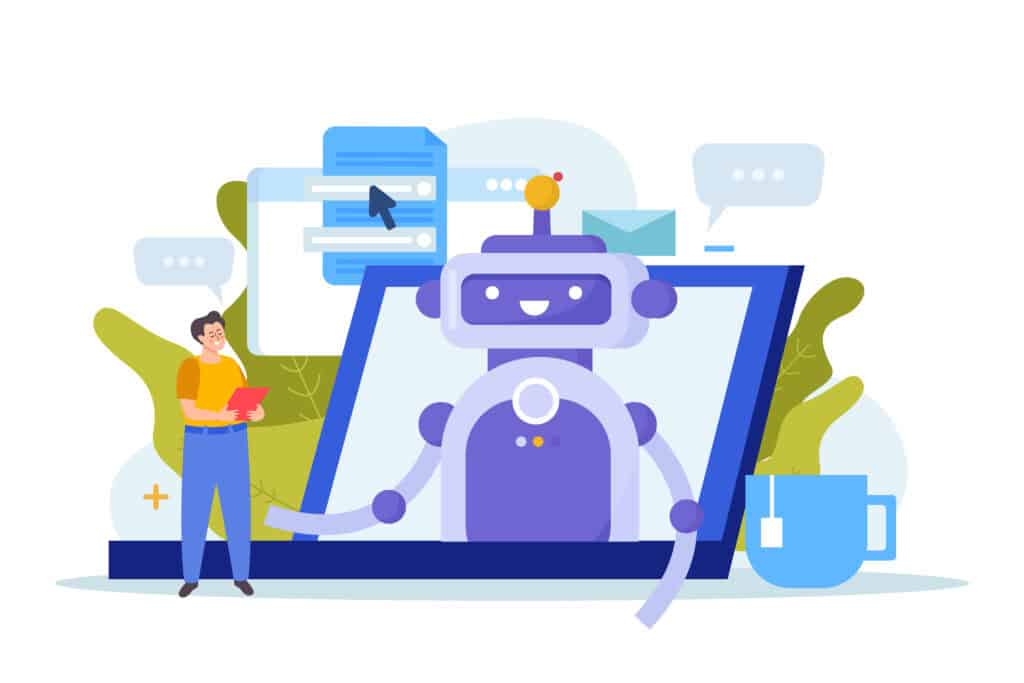Wondering if Google can detect AI content? Then, you’re in the right place. Keep reading.
Ever since AI apps like ChatGPT and Jasper were introduced, the entire content creation and SEO industry has changed.
What used to take hours of research can now be produced with the snap of a finger.
With the amount of time and money saved by companies, you might think that human writers will soon be finding themselves out of a job.
Luckily, that’s not exactly true.
Millions of writers and content creators rely on Google monetization through streams like ad revenue.
The question everyone was asking when these AI language models launched was:
Can Google Detect AI Content? And if they can, how does that affect your SERP and SEO ranking?
It took a while for Google to come clean about its stance on AI-generated content.
Now that we know how the company feels, it’s time to consider ways to avoid being penalized while also utilizing the benefits of AI.
What is AI Written Content?
In the beginning, we had apps called content spinners or article spinners. These programs took existing articles and scrambled them to create “original content”.
However, the result was a poorly-written article that would often lose critical elements like keywords.
Years later, AI technology has evolved to the point where it could soon be indistinguishable from human content.
Never Worry About AI Detecting Your Texts Again. Undetectable AI Can Help You:
- Make your AI assisted writing appear human-like.
- Bypass all major AI detection tools with just one click.
- Use AI safely and confidently in school and work.
Whether you believe it is a benefit or harmful, it is truly a testament to the power of human innovation.
So what is AI-written content? It is any content that was written primarily by a tool that utilizes artificial intelligence and machine learning.
This content is created by providing a prompt which will result in the AI tool providing the output based on your instructions.
Many of these tools are able to learn and continue to improve their outputs with increasing usage.
Can Google Detect AI Content?
This is the question that every content creator wants to know the answer to: Can Google detect AI-generated content?
SEO today is different from what it was like during the time of article spinners. Google has also evolved and adapted to the changing landscape so what it rewarded in the days of keyword stuffing is no longer what it rewards today.
So can Google detect AI-written content? Yes, it can.
Did you really think that one of the most powerful technology companies in history would not have better AI detectors than the ones we can subscribe to?
Google absolutely knows the difference between AI content and human content, but that’s not what matters.
The real question you should be asking is if Google cares if you use AI because that answer has much more of an impact on the monetization and ranking of your content.
How does Google Detect AI Content?
Despite the sophistication of its technology, Google’s AI detectors primarily look for the same patterns in the writing as any other detector.
It uses a number of machine learning algorithms that can improve detection as more content is scanned.
Like with any AI detector, Google only balances the probability that the text was written by AI.
It searches for patterns in the writing that tend to be giveaways that it was AI-written and not made by a human.
Things like word choice, sentence structure, syntax, and predictable grammar style are all hallmarks of AI generation.
You’ve probably noticed that AI-written content usually sounds pretty robotic and mechanical.
This is because AI writing tools will attempt to use similar sentence lengths and syntax for much of its content.
AI detectors also scan for perplexity and burstiness. In content, perplexity is essentially how unpredictable the text is to the reader.
Generally, writers want to be clear and concise and this is how AI writing tools are trained. The less chance the output will confuse a reader the better.
A low perplexity rating is typically a red flag for AI detectors.
Burstiness refers to variation in sentence length and structure. Quite literally, how bursty it sounds when you read the content.
AI writing tools write with very consistent sentence lengths and structure compared to human writers. Burstiness is another tell-tale sign of being created by an AI tool.
Natural Language Processing and Machine Learning
Natural language processing or NLP as it is also known, is the technology that allows computers and software to understand human language.
Machine learning algorithms are used to identify predictable patterns and trends in content.
These algorithms will learn and evolve as AI technology does, allowing them to continuously identify these trends as they change over time.
Google uses both of these in its algorithms to broadly analyze content across the internet. Together, NLP and machine learning can determine how helpful content is in relation to what the reader searched for.
It isn’t just about how many keywords can be found, it is about finding the content that helps the reader the most based on what they are seeking.
Deep Learning and Language Models
Deep learning and language models dive deeper below the surface level of AI. These two concepts are examples of just how much AI has evolved in the past few years.
Deep learning provides AI tools with the ability to analyze and understand sophisticated language patterns.
AI is always learning and the more prompts it is provided with and content it consumes, the more it will improve its outputs in the future.
This is where deep learning comes into play. AI tools can extract data from even the most poorly-written content and use that to provide better content outputs.
Language models are platforms like OpenAI’s GPT-4 or Anthropic’s Claude AI that can produce text outputs based on human instructions.
Think about providing prompts to ChatGPT. Not only is it learning from the prompts you enter, but it is also crawling the internet for context which will better allow it to create content based on its learned logic.
Content Analysis and Semantic Understanding
Content analysis and semantic understanding are the final two ways in which Google can identify AI-written content. Its algorithms run content analysis which can pinpoint the main topics and subjects of the text.
Semantic understanding allows Google’s AI algorithms to understand the words and meaning behind the content. If both of these can identify that the text is helpful to the reader, the article will likely rank higher on Google’s Search page.
Why would Google try to Detect AI Content?
The whole premise behind Google Search is that you can find the answer you are looking for within minutes or even seconds of searching.
The problem with AI-written content is that it can often be poorly worded or even flat-out inaccurate.
If you are just posting AI content without editing or fact-checking, it will likely not rank well with Google.
Google wants to avoid having high-ranking articles that are misleading or incorrect.
Not only is this not helpful to readers but it diminishes the overall usefulness of Google’s search engine.
There is also the monetization of content that Google pays creators for through ad revenue.
If unethical creators are just mass-producing AI-written content to gain revenue, Google will have reason to step in and put a stop to it.
The Impact of AI Content on SEO
AI written contact has already had a major impact on Google’s SEO guidelines.
We’ve seen a shift in the emphasis on keywords to a focus on experienced and knowledgeable expertise.
In Google’s own words: you should now be writing for humans and not for a search engine.
Using AI writing tools can have an impact on the quality of your SEO, especially if you aren’t reviewing or editing these outputs.
AI-written content is generic and mechanical which will seriously impact the readability.
If you are using AI tools, you also need to make sure you fact-check the content. It’s not unusual for AI to produce inaccurate and frankly incorrect outputs. This is referred to as AI hallucinations.
AI is able to produce such believable content that it reads as correct unless you verify it.
Perhaps most importantly now, AI generally does not write content as an experienced and authoritative expert. Google is looking for first-hand experience from writers, something that is difficult for AI tools to reproduce.
Unless you are going through the AI content and adding in your own first-hand knowledge, your AI-written text will not rank well on Google’s search engine.
The Impact of AI Content on Content Production (and Quality)
AI has historically provided users with lower-quality content and although the technology has evolved, not much has changed.
The quality of the writing has certainly improved but it has yet to match the high quality of a human writer.
With AI writing tools, everything is about volume. The highest value in using an AI tool is the hours you save doing research. Generally, outputs are mostly accurate and if you are unsure, it doesn’t take long to fact-check the content.
The amount of text that can be produced has grown considerably and the workload has shifted from researching and writing to editing and rewriting.
Will Google Penalize AI Content?
This might not be the answer you are expecting, but yes–and no. Google has stated that it is not against AI-written content and that websites will not be punished for posting it.
Sites will not get any ad revenue taken away nor will they be suspended. However there is evidence that Google does penalize AI content.
But one way Google will penalize AI content is through SEO ranking. It was a very deliberate shift in the focus on SEO from keywords to experienced expertise.
If you use AI writing tools to produce your content, there is a good chance your articles will not rank as highly on Google. If your site isn’t ranking well, its traffic is going to plummet.
Without traffic, ad revenue and things like strategic affiliate links will not be as lucrative.
Why We Want to Avoid Google Detection
So if Google doesn’t penalize AI content, why would sites still want to avoid AI detection? There are a couple of schools of thought on this.
A certain portion of writers believe that Google will one day penalize AI content in the future.
There is a belief that with so much unpenalized AI content on the internet, everything is going to get watered down.
Another reason does not have to do with Google’s policies on AI content but more so the quality of the content that AI produces.
When mass-producing text with the help of AI, you still need to review the output for quality, originality, and authenticity.
If Google detects that you are using AI for content then the odds are that it is raising red flags for things like sentence structure and word choice.
These are the classic traits of mechanical AI content that is not helpful for readers and also reads poorly.
Leverage AI Without Penalization
When producing high-ranking content with AI we are walking a very fine line. The goal is to leverage AI as much as possible without risking penalization or a drop in your SEO rank.
It can be a challenge but the good news is that it is possible! Here are some ways that you can use AI to your advantage and still produce high-quality content.
1) Follow Google E-E-A-T Guidelines
Right now, nothing is more important in the SEO world than Google’s E-E-A-T guidelines. E-E-A-T stands for Experience, Expertise, Authoritativeness, and Trustworthiness.
These came into effect in December 2022 and it isn’t a coincidence that this was one month after ChatGPT went live.
Why is it important to follow E-E-A-T guidelines? Google is looking for high-quality content that is most of all helpful to readers.
This includes first-hand experience, being an expert or authority, and of course, readable and interesting content.
If you use AI writing tools, your content has a good chance of not hitting any of the requirements for E-E-A-T.
2) Use Undetectable.ai to Make AI Text undetectable
Now if you insist on using AI writing tools to make your content, the least you can do is run it through a site like Undetectable AI.
This site will take your AI-written content and make it undetectable to AI detectors.
Choose from a number of different writing styles and audiences to fully customize your output.
Undetectable switches up the syntax, sentence structure, and sentence length to reorganize your text into what appears to be human-created content.
A subscription also provides access to its own AI detector which you can run your content through to see how well it would do against other AI detector sites.
Undetectable’s output is guaranteed to have a high success rate against popular AI detectors like GPTZERO, Copyleaks, and Sapling. All this for a price that is worth it, as it allows your content to maintain its SEO ranking.
Ready to experience the difference? Try the Undetectable AI widget below quickly and easily (English only). Just input your text and see how it can transform your writing!
3) Mix Human and AI Writing
If you don’t want to pay for any tools like Undetectable.AI, then you can put the work in and edit the AI content yourself.
This is probably the path that most bloggers will take as they are still saving time overall.
To be proficient at this you will need to understand the requirements of Google’s E-E-A-T guidelines. If you’re just editing AI text for the sake of editing it, it does not automatically mean it will rank better.
You will need to edit it in accordance with E-E-A-T while also taking into account changes to syntax and structure.
It’s more work than using Undetectable.AI, but in the end, you should still be coming out on top in terms of hours spent on creating content.
The Future of AI in Google Search
What will the future hold for AI in Google Search? As of now, it looks like Google is taking a wait-and-see approach to penalizing AI content.
It is likely that Google is watching the content creation industry to see how fast AI advances and if the quality of content improves.
It is entirely possible that Google will eventually penalize AI content. When AI writing tools are able to mimic humans and satisfy the requirements of E-E-A-T, we could see further restrictions on what Google deems to be high-quality content.
What we do know for sure is that as AI evolves, so too will Google’s SEO requirements. Strictly using AI-written content is not the recipe for appeasing Google, even if it doesn’t penalize you for it.
Take the time to curate your AI content yourself or with an AI tool like Undetectable.AI. Otherwise, you could risk your SEO ranking being penalized for not ranking highly in the E-E-A-T guidelines.
FAQs
Can Google Identify AI Content?
Yes, Google definitely has AI detectors and algorithms in place to identify AI content. These detectors use machine learning to continue to identify AI content even as the technology to produce this text evolves.
Does Google Consider AI Content Spam?
Google does not consider all AI content spam. If it violates Google’s anti-spam policies then it can be flagged as such. Some AI content, like AI-written reviews, is considered spam by Google.
Does Google Penalize AI Content?
No, Google will not penalize you for using AI content. Your content will likely not rank high as most AI content does not satisfy Google’s E-E-A-T requirements for SEO ranking.
How do I make AI Content Undetectable?
By using a program like Undetectable.AI which re-arranges your content to pass AI detectors and appear human-written. Not only does Undetectable.AI change your wording but it also restructure your text to avoid being flagged for predictable syntax that is a hallmark of AI content.
Conclusion
When it comes to Google, we need to realize they know what they’re doing. The answer to “Can Google detect AI content?” is a resounding yes.
Google can definitely identify AI content with its advanced algorithms and machine-learning technology. Despite this, Google does not penalize you for using AI content on your site. Why do you think this is?
In December 2022, Google moved the goalposts on creators using AI to produce content.
Rather than putting a blanket ban on AI content, Google introduced strict guidelines for E-E-A-T which is now the driving force behind how well content ranks. AI writing tools lack the ability to competently incorporate E-E-A-T.
Thus we come to an interesting conditional statement. Google does not directly penalize AI content but it can detect it. For now, AI content generally does not satisfy E-E-A-T. To rank highly on Google, you need to meet the E-E-A-T guidelines.
Of course, this will change as AI writing tools and language models continue to advance.
Until then, editing AI-written text or running it through a tool like Undetectable AI are your best bets if you want to leverage AI to produce your content.
Click here to access the tool and leverage AI without penalization.





